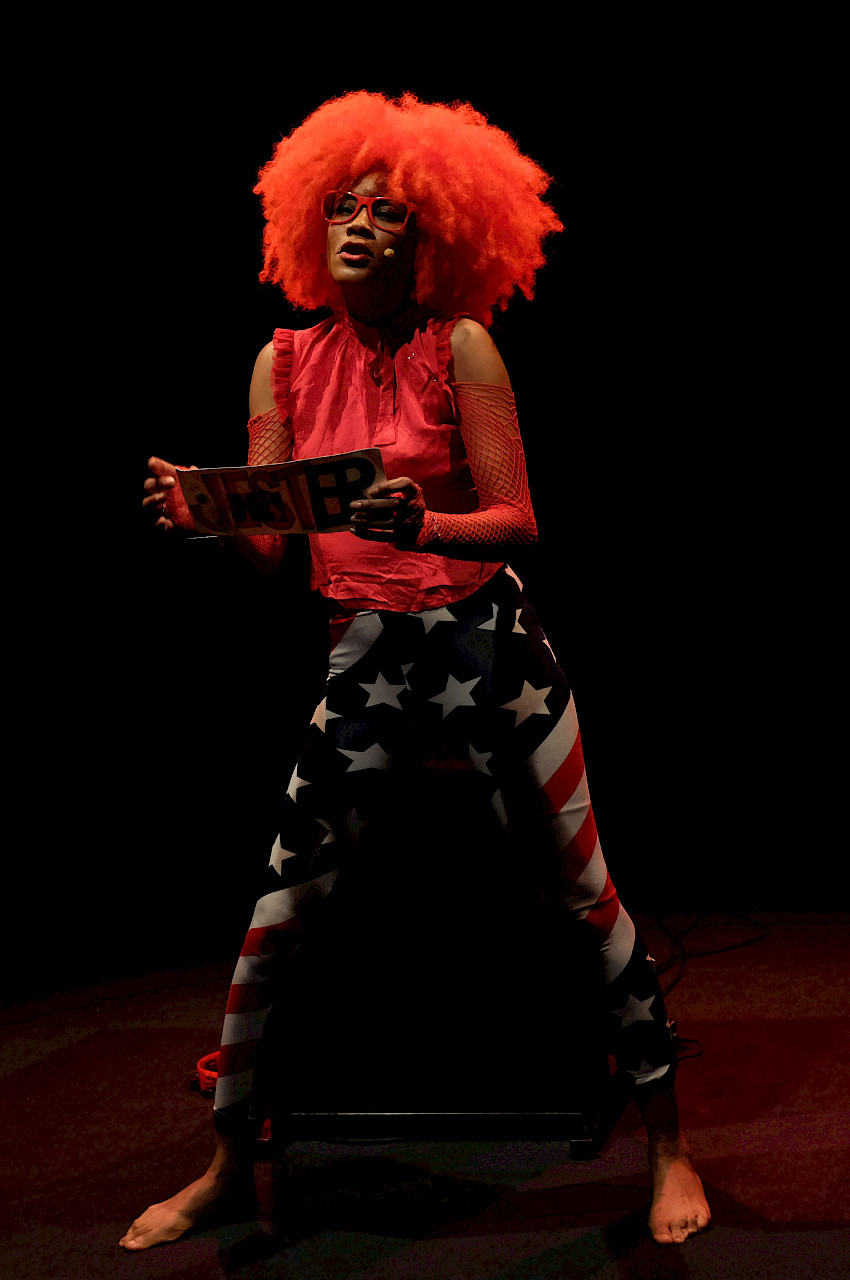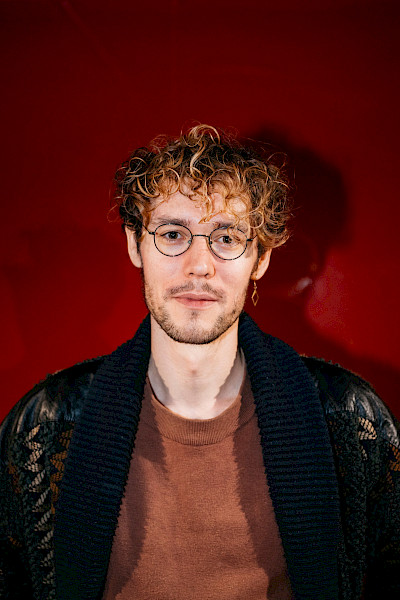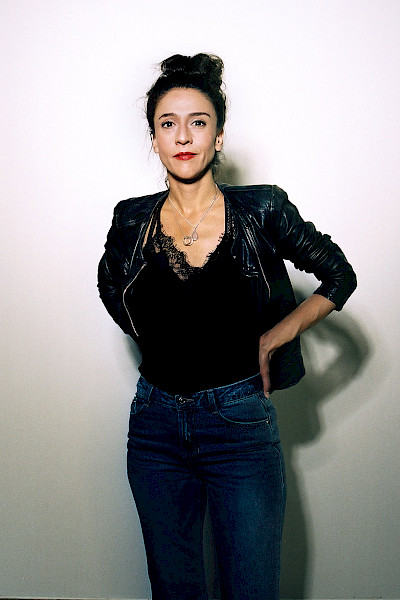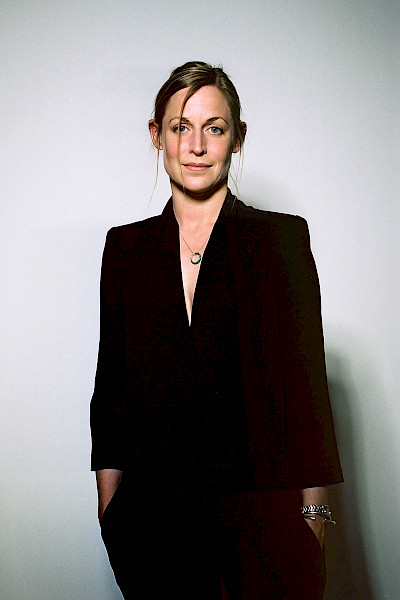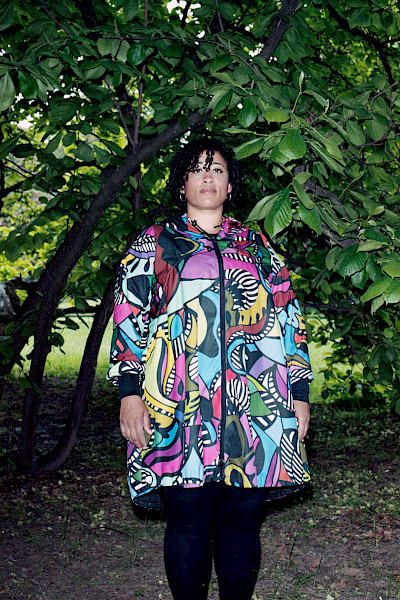Schweizer Propagandakonferenz (Swiss propaganda conference)
Essayistic conference with lectures and lecture performances
director and author boris nikitin dedicates this three-day conference to the raw material of “the public sphere,” over which a global competition is raging. as never before, it is about being seen and heard: for purposes of political mobilization, in search of solidarity, showing one’s own emotional worlds, or simply to advertise products. here, the shared public sphere is a limited resource and, as it were, the stage on which people represent — and present — “their” reality and thus help to shape reality. this courting, fighting, shaping, manipulating, creating and manufacturing of reality can be summed up in one term: propaganda. in the spk conceived and curated for the neumarkt, nikitin now invites twelve positions to the theater that illuminate the production of the public sphere and reality and/or already activate them themselves. the twelve speeches, lectures, lecture performances, and conversations are about propaganda — and are propaganda themselves.
#schweizer propaganda #wirklich #positionen #wettbewerb #aufmerksamkeit
overview
friday, 27.9.2019
5 pm — robin laverne wilson aka dragonfly
black queer madness as hypersanity
opening performance in english
18.15 – rabih mroué
war, art and propaganda
english language conversation
19.30 - break
20.15 – deborah feldman
betrayal and structure
lecture
21.15 – i̇mran ayat
campaign above all
lecture performance
saturday, 28.9.2019
14.00– david eugster
winning the public trust
lecture
15.00– franziska schutzbach
how does right-wing populist rhetoric work?
lecture
16.30–break
17.00 – brandy butler
untitled
lecture performance with songs
18.00–break
19.30– georg seeßlen
influence or the art of reigning in minds
lecture
20.30 – storm & störmer
worst case scenarios — the propaganda film. beauty of ideology
lecture performance
sunday, 29.9.2019
14.00– dean hutton
plan b, a gathering of strangers
lecture performance
in english language
16 .00– geoffroy de lagasnerie
for an ethics of works
lecture
in english language
17.00– break
17.30 – didier eribon
politics of shame (redux)
talk
in english language
followed by a closing drink
the detailed program
friday, 27.9
robin laverne wilson aka dragonfly
black queer madness as hypersanity. a summary of my afrosurrealistic life
«living in perpetual resistance from birth to current — in a neocolonial world order that prefers i sit down and shut up — is my greatest artistic legacy. through story and song — and for a minute per each year lived to date — i reflect upon my own contradictions, liberate skeletons from my closet, dance with my ‹shame›, and reclaim them all as my shamanic superpowers.»
from a text by dragonfly aka miss justice jester (2019)
robin laverne wilson, also known by the alter egos dragonfly, miss justice jester, or helvetika bold, is an american conceptual artist and political activist. in her work she moves between performance, ritual storytelling, musical acts and guerrilla actions. as a member of the activist performance group reverend billy & the stop shopping choir, she has toured the world for many years. in 2016, she ran for a senate seat representing the green party in new york state. for the swiss propaganda conference spk she gives the opening speech, which is at once distorted song, incantation and political agitprop.
rabih mroué
war, art and propaganda
rabih mroué is one of the representatives of a lebanese contemporary art that has been dealing with the representation and manipulation of reality for over three decades. the documentary style, developed together with other lebanese artists such as walid raad, akram zaatari or joana hadjithomas, is characterized by questioning the reliability of the document as an image of the real. a photo, a poster, a newspaper article or a political speech always communicate more than they pretend to. for all these artists, this potential uncertainty of the real is based not least on the experience of the lebanese civil war in the 1980s, in which all the groups and parties involved claimed sovereignty over the interpretation of events for themselves and propagandistically disseminated it. an experience that anticipated the conflicts of our time?
in a conversation with boris nikitin, rabih mroué explains the background to his work and takes a look at the relationship between propaganda and conflict, between art and war.
rabih mroué, born in beirut in 1967, is a performance artist, director, writer, visual artist, and editor of the drama review (tdr) and kalamon magazine. his works have been shown at moma/new york, hkw/berlin, salt/istanbul, documenta (13)/kassel, münchner kammerspiele, wiener festwochen, hau/berlin and basler dokumentarfilmtage, among others.
deborah feldman
betrayal and structure
deborah feldman, born in 1986, grew up in an ultra-orthodox hasidic community in the williamsburg neighborhood of new york. feldman recounts her childhood and youth, which were shaped by religious rituals and rules, in her autobiographical novel “unorthodox.” the book, published in the u.s. in 2012 and in german in 2016, became an international bestseller. in it, feldman describes how identities and worldviews, as well as taboos, feelings of shame, misunderstandings, and chasms, form in religious communities and beyond. last but not least, feldmann’s book is a portrait of the subjugation of the body through the language of religious and secular laws that regulate and order the relationships between members of society to each other, but also to themselves.
however, feldman does not describe this form of structural violence solely as a phenomenon of “male” exercise of power. rather, it emphasizes the crucial role that mothers and grandmothers also play in the transmission of oppression. thus, she writes, “i feel betrayed by all the women in my life.”
for the swiss propaganda conference spk, feldman thinks this thought further: what is treason? to what extent does the structure of betrayal as a whole represent the production of reality? and how do betrayal and self-liberation relate to each other?
saturday, 28.9
i̇mran ayat
campaign above all
i̇mran ayata — born 1969 in ulm — is an author, dj and co-owner of ballhaus west, a campaign agency based in berlin. ayata is considered one of the central marketing experts in the german-speaking world. he was a co-founder of the anti-racist, anti-nationalist movement kanak attak. at the same time, as an advertising specialist and campaigner in the noughties, he accompanied the communication of the pension, labor market and health care reforms as part of the agenda 2010 of the red-green federal government. the campaign can be read as one of the most successful propagandistic operations in recent german history: “agenda 2010” or “hartz iv” are terms that are still an integral part of the current political debate in germany. in 2017, ayata launched the #freedeniz campaign, which called for the release of journalist deniz yücel from his pre-trial detention in turkey and resulted in yücel’s release in 2018
in a lecture performance that itself meanders between pr rhetoric, capitalist-pop culture irony, and hard facts, ayata uses various examples to demonstrate the mechanisms and techniques of modern campaigning in an age of fragmentation. in doing so, he shows how images and texts are used to create expectations and beliefs, how norms are analyzed and shifted, and how realities are asserted and sold.
franziska schutzbach
how does right-wing populist rhetoric work
right-wing populist rhetoric is not a phenomenon somewhere on the right-wing or far-right fringes of society; it has long since arrived in the feuilleton, in liberal and even left-wing circles. right-wing populist communication strategies aim to shift the social discourse, to integrate right-wing or radical right-wing ideas into the center of society, and in this way to make them “common” — especially among those who do not describe themselves as right-wing. one of the main points of reference here is an ongoing polemic against feminist or identity politics concerns and positions that are portrayed as “exaggerated,” “hysterical,” “discriminatory,” or “totalitarian.” this polemic against “identity politics” or “political correctness” imagines itself as a defense of “free speech” and is currently the journalistic zone in which supposedly liberal-conservative and even left-wing thinking shifts to the right and in which right-wing thinking becomes common sense.
in her lecture, franziska schutzbach analyzes the means of such rhetoric and shows the stylistic and content-related strategies and tricks of this consciously or increasingly unconsciously operated discourse shift. their analysis focuses on central rhetorical topoi such as “political correctness,” “gender mania,” “homo lobby,” “feminazis,” “re-education,” or “egalitarianism.”
franziska schutzbach, born 1978, is a gender researcher, sociologist and feminist activist. she became known to a wider audience through her book “the rhetoric of the right” (2018). she teaches and conducts research at the center for gender studies at the university of basel.
brandy butler
untitled
the history of music and song is a fund of subversive historiography. some songs tell about biographies and fates of individuals or whole groups of people, whose lives are concealed in official archives. in the voices of the singers, the deceased, the killed and the silenced return to the present, and in this way songs enable a ghostly encounter between generations.
in her lecture and song performance, singer and performer brandy butler takes on music as a ritual of remembering and as a form of alternative collective memory. in the process, she is also researching the unheard voices of black slaves in the u.s., whose stories she unearthed at the library of congress in washington, d.c.
brandy butler, born and raised in reading, pennsylvania, is one of the most important voices in the swiss music and activist scene today. she has performed with sophie hunger, erika stucky, sina, stress, steff la cheffe, phenomden and many other colleagues and toured with the bands chamber soul, dee day dub, brandy butler & the fonxionaires and king kora through europe, the usa and africa. for several years she has also been a performer on german-language theater stages, including the munich kammerspiele and the schauspielhaus zurich. brandy butler has been a permanent ensemble member of neumarkt since the 2019/20 season.
georg seeßlen
influence or the art of reigning in minds
in his lecture, georg seeßlen focuses on propaganda as a conceptualization that targets attitudes and actions and implies the cession of a part of the personality to a “great other.” seeßlen addresses newer methods of influence, such as nudging or framing, as well as fluid, viral forms of disseminating discourses and instructions for action, including fake news, shitstorms and hate mails or the “propaganda of the deed”, in which acts of violence are multiplied as media events; and this as a triad of image, narrative and concept. propaganda makes enlightenment difficult or even impossible, because it always strives for a totality that addresses not only official discourses or ideologies, but also the religion or sexuality of the recipients. how to respond to these forms of reality bending? where are the limits of enlightenment and analysis? is there meaningful counter-propaganda? can propaganda, for its part, be treated subversively? is there even communication without propaganda?
georg seeßlen, born in munich in 1948, is a film theorist and pop scholar, author and editor of more than twenty books on film, including david lynch, quentin tarantino, stanley kubrick, and martin scorsese. seeßlen writes regularly as a freelance author and journalist for the wochenzeitschrift, die zeit, frankfurter rundschau, taz, jungle world and der freitag.
storm & störmer
worst case scenarios — the propaganda film. beauty of ideology
the satirical series “worst case scenarios — bad art. lectures with case studies” by the actor duo cathrin störmer and andreas storm is cult. for several years they have been scouring the various spheres of society, art and culture for their accidents, failed projects and aesthetic abysses. bad literature, cheap films, clumsy works of art, embarrassing politics — nothing is safe from the research urge of the two collectors. in the process, something that is usually hidden always shines through: the beauty of the bad and the non-perfect, the glamour of an accidental subculture.
for the swiss propaganda conference, storm & störmer invite you into the realm of propaganda film. they show the most beautiful, bizarre and strange propaganda pearls, educational films and go into the underworld of truth production. propaganda is documentation on drugs. rarely have the alternative facts shimmered more seductively.
sunday, 29.9
dean hutton alias goldendean
plan b, a gathering of stangers
dean hutton aka goldendean, born 1976 in johannesburg, is a photojournalist, activist and performance artist who fights with dazzling and controversial actions in south africa for a public space free of colonial and patriarchal violence. the offensive means that goldendean brings to bear and refers to as “fat queer trans white” is repeatedly her own body. during the student protests in 2016, she caused a stir with her #fuckwhitepeople action. the action was challenged for hate speech, but was dismissed by the south african equality court in 2017, citing artistic freedom.
in her lecture performance, the south african artist addresses the effects and affects triggered by small, simple acts of dissidence. the lecture explores how strategies of self-reflection, radical sharing, and queer civil disobedience can contribute to bringing whiteness out of normalized invisibility and exposing white bodies to critical scrutiny. at the same time, goldendean propagates and agitates for a right without which a non-violent space is inconceivable: the right to otherness.
geoffroy de lagasnerie
for an ethics of values
“when we talk about inequalities in access to museums, galleries, or other art spaces, we often refer to the need to take measures to democratize access to works. but in some ways, that’s a mistake. in my view, inequalities in access should not be understood as a deficiency to be remedied. rather, they reveal the function of art, which is objectively to produce social exclusions. inequality, then, is not a flaw; it is the goal.” geoffroy de lagasnerie
in his lecture, de lagasnerie analyzes contemporary art as a structure that, contrary to and at the same time due to its permanent emancipatory claim, primarily produces social exclusions. knowing this paradox, he nevertheless asks: how can we produce a radical, independent, and destabilizing aesthetic that is neither bourgeois nor popular, but that would change everyone in terms of their relationship to the world?
geoffroy de lagasnerie, born near paris in 1982, is a philosopher and sociologist. together with didier eribon and the writer édouard louis, he belongs to a circle of parisian intellectuals who are causing a stir in the french public with actions for the rights of homosexuals and against a new xenophobia. in addition, in recent months they made the case for a differentiated view of the yellow vest movement , who have been demonstrating against emmanuel macron’s policies in france since december 2018.
boris nikitin and didier eribon
politics of shame (redux)
shame is an unpleasant feeling. it creates feelings of inferiority and powerlessness in us. thus, many people’s lives consist, in no small part, of avoiding and avoiding this unloved feeling. boris nikitin and didier eribon had their first conversation on the topic of shame at the basel documentary days in april 2019. now they continue the conversation and try to explain in what way shame and the related act of silence and concealment can be considered as essential social, reality-constituting factors. the pointed thesis: any form of politics and propaganda ultimately aims at the shame of the individual. it is the vanishing point from which norms, laws and codes of conduct are established. at the same time, it is in the appropriation of shame that the political subject takes place in the first place: shame and fear are not only opponents of the emancipatory, rather they bring them forth.
didier eribon, born in 1953 in reims, teaches sociology at the university of amiens. in his autobiographical work “return to reims,” the sociologist examines the unfolding of his own homosexuality in the context of the political culture of his milieu of origin, the working class in northern france. he is one of france’s leading public intellectuals and regularly takes a stand on current political events.
With
Robin LaVerne Wilson aka Dragonfly, Rabih Mroué, Deborah Feldman, Imran Ayata, Franziska Schutzbach, Brandy Butler, Georg Seeßlen, Storm & Störmer, Dean Hutton alias Goldendean, Geoffroy de Lagasnerie, Didier Eribon
Production Team
Kuration: Boris Nikitin
Dramaturgie: Eneas Nikolai Prawdzic
Dramaturgische Begleitung : Julia Reichert, Hayat Erdogan, Tine Milz

